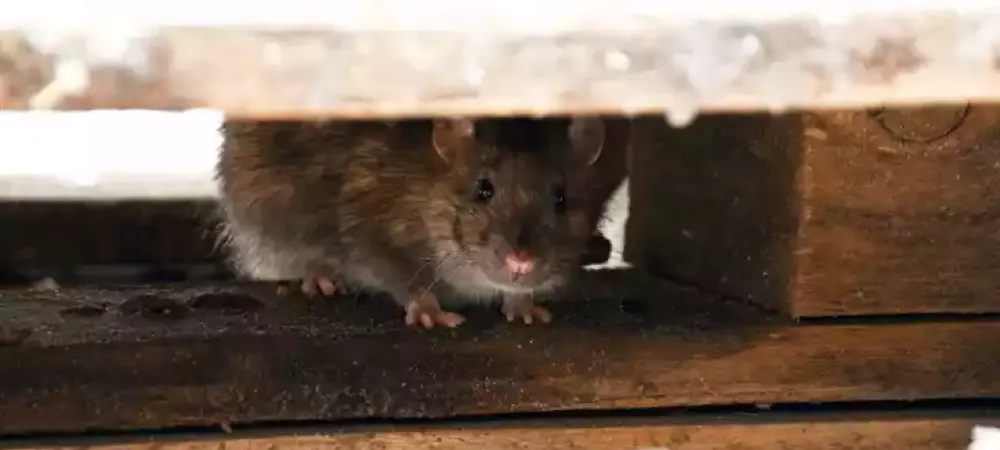Preventing Rodent Infestations in Your Home

Many people welcome the slow transition from hot summer days into crisp, cool autumn nights. However, homeowners don’t necessarily realize that chilly fall weather can also bring with it unexpected house guests.
It’s common for rodents, particularly mice, to seek out warm shelter during colder months. This makes it important for property owners to understand how rodents get into their homes and figure out the best way from blocking an invasion.
Rodents can carry disease and create destruction during their temporary visits. Therefore, it’s best to avoid the problem right from the start by blocking rodents from getting inside your house.
How Rodents Enter Your Home
Rodents are highly creative when they are seeking out shelter. First, mice have body shape that makes it easy to squeeze through any ¾-inch hole. Any tiny openings, like cracks or gaps, found along home floors, walls, windows, and pipes make a great rodent doorway.
Second, rodents use their strong teeth and sharp claws to help make a way where there is none. In fact, mice and rats can chew through wood, plastic, pipe, and even brick. It’s possible to spot evidence of rodents by observing brown smudges on your walls, musky or stale smells, and gnaw marks.
Below are a few details about the many ways rodents can easily enter your home.
Small Cracks and Holes
Small holes or cracks in your home’s foundation are the perfect openings for mice. Rodents can scratch, crawl, or climb through any unsealed openings in the bathtub or sink drains, as well as utility lines (e.g. sewer, gas, cable, water). To avoid this situation, you can use caulk for small holes. Bigger cracks and holes can be blocked with waterproof sealant or steel wool.
Rodents like to nest near a food source so don’t overlook your kitchen or bathroom cabinets, the back of closets, and kitchen appliance motors.
The Roof
Rats, mice, chipmunks, and other resourceful rodents can get onto your roof and then enter your home through openings in the chimney, attic gables, or ridge cap. Property owners can sometimes overlook the roof as a critical access point. Be sure you install a chimney grate or cap to deter rodents. It’s also a good idea to have the chimney professionally cleaned. The chimney sweep can check for signs of rodent nesting material or droppings.
Water Pipes and Drains
You might be surprised to learn that most types of rodents are excellent swimmers. Mice and rats can hold their breath underwater and emerge through the bathtub or sink drains. That’s why it’s a good idea to install grates or screens on every drain.
Garages
Be sure to inspect your garage along with your home. Rodents that gain access to your garage could cause a tremendous amount of damage. For instance, mice have been known to damage water heaters, exposed wires, automobiles or motorcycles, and other personal property. Garage doors that closely properly and sit flush along the ground are the biggest rodent deterrent.
Be sure to also check your crawl spaces, attics, and basements for any access points, then seal those shut right away. Mice droppings or nests may be found in storage boxes, old clothing, or paper piles.
Other Entryways
Rodents that can’t find a quick entryway will make their own by chewing or scratching. For instance, mice and rats can chew through window screens, drywall, and oven gas lines. Any gaps you find in the structure of your home should be sealed with cement or metal. You can also cover dryer vents with metal screens.
Also, be sure your windows and doors (including pet doors) close properly. A screen door that doesn’t shut all the way is exactly what rodents are seeking. Outside doors should also have brush strips along the bottom to discourage unwanted visitors.
Make sure your exterior brick isn’t crumbing or loose because rodents will exploit those weaknesses to get inside.
Impact of a Rodent Infestation
The reason property owners, like yourself, take the time to block rodents from entering is because of the associated structural damages and health risks. If you’ve lived at your home for a while and never dealt with mice, don’t expect things to stay that way. An early frost or harsh winter usually forces rats inside and that could trigger your first rodent infestation.
Keep in mind, after a colony of rodents invades your home, they will rarely leave. This is because your property offers a safe, warm space where they can access food and water. A few mice can rapidly multiply and easily exceed 200 within only a few months.
Structural Damages
Homeowners want to avoid structural damage, particularly from rodents. Mice can chew through anything, including pipes and electrical wiring. This can compromise your safety and be quite expensive to repair. Perhaps the greatest threat from rodent infestations is a home fire or gas explosion.
As we mentioned earlier, rodents can chew through just about everything. If a mouse chews the wiring on your home appliances or chews through a gas pipe, you could find your dream home up in smoke.
Health Risks
Property owners also want to avoid the many harmful diseases dirty rodents can transmit. Mice carry a variety of “superbug” diseases and bacteria that can be spread to humans through their feces and urine. If your home is infested with rodents, your family will be exposed to serious illnesses like Salmonella, Rat Bite Fever (RBF), and Typhus.
Other ailments like leptospirosis and Lymphocytic Choriomeningitis (LCM) are also a possible risk. Leptospirosis is serious enough to cause human kidney damage and/or liver failure. LCM is particularly harmful to pregnant women, resulting in birth defects or possible death.
Get Professional Help for Rodent Control Services, New Jersey
When it comes to rodent infestations, the best tactic is prevention. Obviously, homeowners that do an annual inspection of their property will become familiar with weak spots within the home’s structure.
It’s easy enough to protect gaps and cracks that make for an easy rodent entryway. However, even if you do everything correctly, you can and still find yourself sharing space with mice. Don’t settle for traditional mouse traps or rat poison. The most effective way to eliminate rodents is to get help from professional rodent control services.
Since 1985, Dial Environmental has offered expert pest control throughout the Northern New Jersey area. You’ll be in good hands with us because we won’t stop until your rodents pack up and move away.
Our long-standing pest control company opts for the “We Choose Green First” program by using eco-friendly, botanical products that keep your family safe. Contact us today and ask for licensed, insured, and guaranteed pest control assistance. We pledge to keep coming back until the rodents no longer do.
